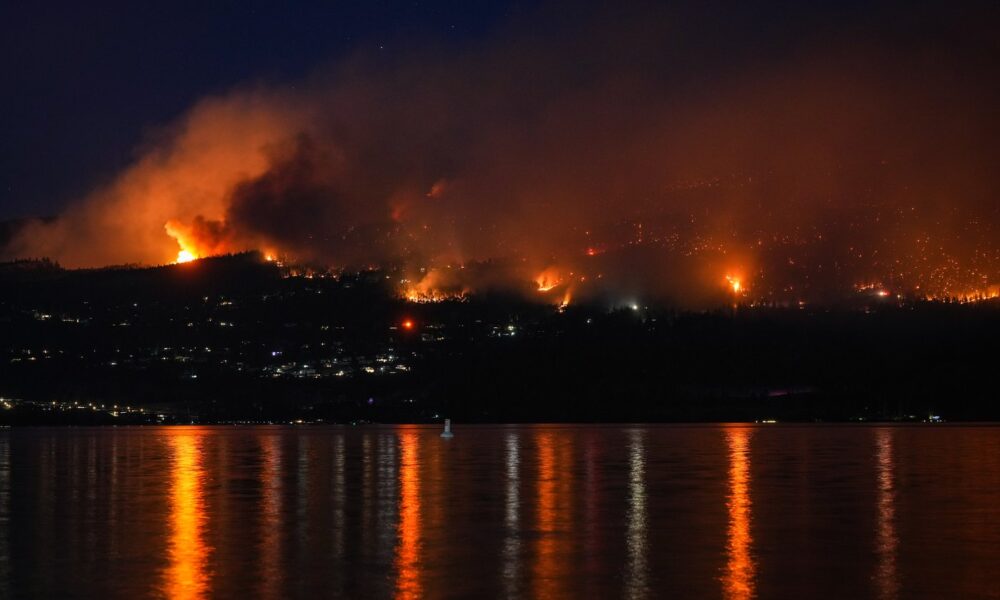World
Fire-proofing B.C. homes; expert weighs in as L.A. blazes rage on

As crews try to gain the upper hand on massive wildfires in California that have left several people dead and many more injured, one expert in B.C. says there are ways to retroactively protect structures, but it comes with some downsides.
Felix Weisner is an assistant professor in the Faculty of Forestry at UBC. He says, unfortunately, what’s happening in the Pacific Palisades shouldn’t surprise anyone, given the area is at high risk of fire.
“California has very strict building codes, but usually what happens is it takes a while for these to trickle through the building stock. So, if you think about a house that was built 30 years ago, it might not be up to code,” he explained.
“If you build a house now, you have to follow much stricter guidelines. And a lot of those homes are in, what we call, severe wildfire areas.”
In B.C., which is no stranger to devasting wildfires, he says many homes and buildings here aren’t up to code either and points to the massive Lytton wildfire in 2021, as an example.
“In B.C., and this is Canada-wide, we don’t really have a standardized building code for wildfires. We have a pretty robust method to build for fires that start on the interior, but for wildfires, it’s more guidelines and it’s really up to local bylaws to deal with that.”
Weisner says it is changing, but not fast enough.
In the meantime, he adds there are ways to protect your home, but there are downsides.
“If you have an awful lot of money, you can always build a bunker-like structure that will withstand a very severe wildfire. The problem is finding a balance. There are costs, there are environmental concerns — building a massive concrete structure has a lot of embedded carbon, so that’s not really the direction we want to go,” he stated.
“Of course, if you really want to build to a standard where your housing can withstand a wildfire, you have to limit combustible materials. You can’t have a nice, big porch or deck. You would have to go for smaller windows, maybe more expensive materials.”
He adds you would also have to keep the area around your property clear — your neighbours would have to follow the same guidelines.
Weisner says the biggest obstacle is also the expense.
“Usually building more wildfire-resistant means you have to take additional costs, so there are some limitations on what you can build, especially when you think about where wildfires happen, it’s always more remote communities, so people there value their space and independence to build what they want,” he explained.
“If we’re talking about wildfire prevention and better construction against wildfires, we need to realize that makes them especially vulnerable being so close to shrubs and trees that tend to provide fuel.”
He points out that other areas of the world have taken steps to address wildfire concerns, but not so much in B.C.
“If we try to build every home to the maximum level, we’re wasting a lot of resources. It’s really about looking at: where’s your building located? What’s the surrounding vegetation? What’s the slope? That way you can define a fire risk zone and you can adjust your construction requirements based on that. At the moment, it’s not implemented in the regulations yet. It’s not standardized.
“California has already made steps on that. Australia has a very comprehensive wildfire code that came in a few years ago and because it takes a while to bring all the buildings up to code, we won’t see the effect of that for a few years.”
In the meantime, the Ministry of Forests says provincial crews have not yet been sent to California, but they will be ready to go at a moment’s notice.
“British Columbia knows all too well the devastating impacts of wildfires. We have strong relationships with our international partners, including the California Department of Forestry and Fire Protection, and B.C. will provide support in any way we can in the days ahead. At this time, BC Wildfire Service assistance has not yet been requested for the ongoing effort to fight these fires,” said Minister Ravi Kahlon in a statement to 1130 NewsRadio.
You can watch CityNews 24/7 live or listen live to 1130 NewsRadio Vancouver to keep up to date with this story. You can also subscribe to breaking news alerts sent directly to your inbox.